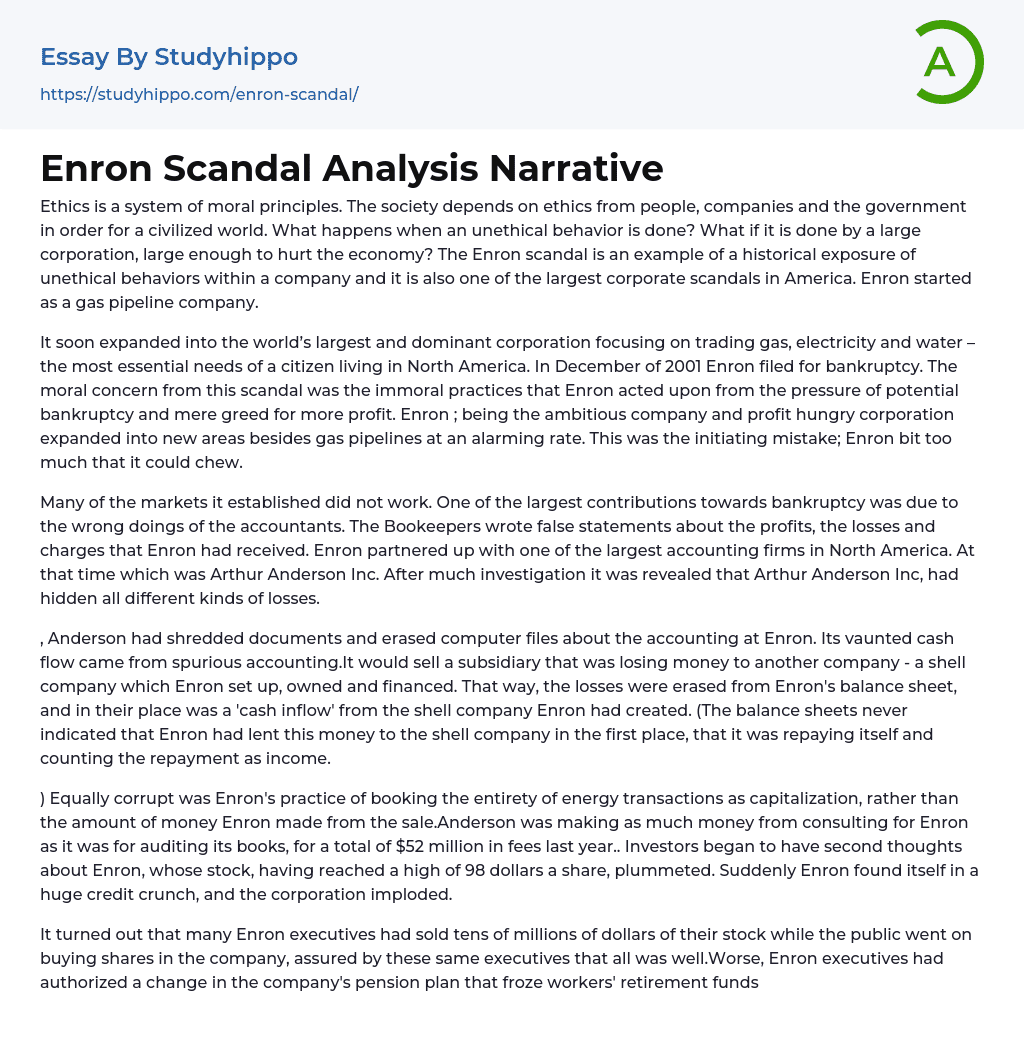Observance of ethical principles is vital for a civilized society, covering moral standards applicable to individuals, corporations and government. Unethical conduct may have serious consequences, particularly when committed by large companies that can cause significant economic damage. Enron's past scandal exemplifies this issue as one of the most prominent corporate scandals in American history. Despite being established as a natural gas pipeline firm, Enron's immoral acts were ultimately revealed.
Enron became the top global corporation in gas, electricity, and water trading - essential commodities for North Americans - due to its fast growth. However, Enron's unethical practices resulted in bankruptcy in December 2001. By prioritizing profits over ethics, the company made poor choices such as expanding beyond their initial gas pipeline focus. Ultimately, Enron's downfall was caused by their ambition.
Enron's bankruptcy can be attributed to numerous
...market failures and fraudulent accounting practices committed by its bookkeepers. These accountants fabricated financial statements that misrepresented Enron's profits, losses, and charges. Enron also formed a partnership with North American accounting giant Arthur Anderson Inc., which was later discovered to have concealed various losses.
Anderson destroyed records and deleted digital data regarding Enron's financial reporting, revealing that their highly-praised cash flow was the result of fraudulent accounting practices. Enron fabricated a shell company to which they sold a subsidiary that was unprofitable, effectively erasing the associated losses from Enron's balance sheet. This allowed for the shell company to appear as though it had provided a cash inflow to Enron, despite Enron being the owner and financier of the shell company and having loaned it the money in the first place. These transactions were not reflected accurately in Enron's balance sheets
and were counted as income.
Enron participated in corrupt activities, including capitalizing entire energy dealings instead of actual profits. Anderson received $52 million in fees for both auditing and consulting services for Enron last year. Consequently, despite reaching a peak stock price of $98 per share, investors lost trust in Enron. This loss of confidence led to significant decline and an ensuing credit crunch that ultimately caused the company's collapse.
Enron's executives sold a significant amount of their stock, despite publicly claiming that the company was stable. This led to many individuals unwittingly investing in the organization. Furthermore, the executives altered the pension plan and engaged heavily in politics. The revised plan froze employees' retirement funds in Enron stock, which was decreasing in value. Concurrently, these executives were selling their own shares, rendering workers' pension plans worthless. Enron additionally donated money to political parties; for instance, they gave $1 million to the Republican Party, who had previously passed laws that favored Enron's unethical business activities.
Enron invested heavily in politics, contributing $6 million in the 2000 election. The Democratic Party, which oversaw the laws and policies that Enron sought to change, received $500,000 while Mr. Bush received $113,800. Enron's political influence allowed them to receive favors such as having a Federal Energy Regulatory Commissioner fired due to regulations that Enron did not approve of regarding energy and electricity.
Close ties with politicians led to five years of tax evasion. An informant identified Enron executive Baxter as a significant figure who opposed the use of LJM partnership by ENRON to hide immense quantities of debt, and his mysterious death was assumed to be a suicide attempt. This highlights not only
the corrupt practices of the conglomerate, but also the moral issues involved. The company resorted to unethical behavior in times of financial trouble.
Despite engaging in activities that were unlawful, the affluent and dominant corporation managed to circumvent legal consequences due to their financial power and influential ties with politicians and other companies. Moreover, these unethical practices had a significant impact on the economy at a broader level.
The issue of moral wrongdoing and job loss resulting from greed, which also involves the government, is being faced.
- Accounts Receivable essays
- Auditor's Report essays
- Balance Sheet essays
- Costs essays
- Financial Audit essays
- International Financial Reporting Standards essays
- Tax essays
- Accountability essays
- Cash essays
- Principal essays
- Management Accounting essays
- Internal Control essays
- Accounting Software essays
- Cash Flow essays
- Accounting essays
- Andrew Carnegie essays
- Automation essays
- Business Cycle essays
- Business Intelligence essays
- Business Model essays
- Business Operations essays
- Business Software essays
- Cooperation essays
- Cooperative essays
- Corporate Social Responsibility essays
- Corporation essays
- Customer Relationship Management essays
- Family Business essays
- Franchising essays
- Harvard Business School essays
- Harvard university essays
- Human Resource Management essays
- Infrastructure essays
- Inventory essays
- Logistics essays
- Management essays
- Manufacturing essays
- Market essays
- Marketing essays
- Multinational Corporation essays
- News Media essays
- Online Shopping essays
- Quality Assurance essays
- Richard Branson essays
- Sales essays
- Selling essays
- Shopping Mall essays
- Small Business essays
- Starting a Business essays
- Stock essays




